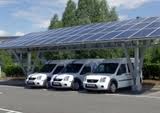
Slanting roof solution. Instead of letting the sun over-heat your car, why not get it to power it instead?
The big solar energy news this week came from California, where Tesla announced a relay of solar charging stations for its electric cars throughout the state, with the promise of rapid expansion next year. The stations should be in Europe before too long.
Elon Musk, co-founder of Tesla Motors, sent a powerful and persuasive message to the still very many electric car doubters, that they can now get enough charge in an hour to give their cars a 300 mile range. It will cost them nothing, and this zero cO2 driving will pollute no one.
This is a very select, and selective, service Musk is offering. It is only available to owners of the Tesla S (already far superior to other electric cars (EVs), with a top range of 300 miles), and no other car can be charged at the stations because they can’t cope with the injection of so much energy.
But these are a technical details, which will surely be overcome: allowing other EVs to use this facility. The point here is that an electric car aimed at the mass-market (the base model will start at $49,900), can be “refuelled” in not much more time than it takes to fill up a conventional car, during a leisurely stop.
A reader of one of the articles I saw asked if solar electric car charging would work in the UK. The simple answer is, yes it already is. At least two solar car parking points opened in the summer of 2012, one in London, and the other in Bristol. Both, when they need to, will draw additional power from the National Grid, but at least for part of the day it will be possible to charge a car with solar energy alone.
These stories didn’t receive anything like the publicity in the UK that the Tesla story achieved worldwide, and perhaps we need an Elon Musk over here, although that’s not so easy when the UK doesn’t actually make any electric cars. (The Japanese firm Nissan will, of course, opened its Leaf factory in north east England shortly.)
The latest car charging station opened last week in Bristol. The company Solarsense set it up at its headquarters. Electric car drivers will be able to pull in and charge their vehicle for nothing using solar energy. It will take four hours to fully charge an EV using the fast charge mechanism. The carport can be used by people just wanting to top up their battery. As well as offering solar power, the carport can provide electricity from the grid for charging during the night. A 4kW carport costs £14,500, while a 3.6kW carport costs £11,500.
The other solar EV charging point point, the eTap, is at the Centre for Engineering and Manufacturing Excellence in Rainham, East London. It is a collaboration between EV charging specialist APT Technologies and solar developer Use The Sun.
The eTap unveiled by transport minister Norman Baker on July 6 consists of solar panels on a steel canopy over six parking bays. Drivers will be charged £1 to plug in, and then 63p an hour, making payments through their mobile phones.
Use The Sun says the British designed and built eTap is capable of topping up an electric car’s range by about 15 miles for each hour it is plugged in. It estimated that one eTap would produce enough solar power to give a 50% charge to 700 vehicles in a year. But there are plans to upgrade the system, enabling it to charge vehicles twice as quickly.
The cost of installing and buying a six-bay eTap is about £55,000. Use The Sun say it could cover its cost in 10 years. Companies deciding to set up the facility on its property would make money for itself through the government’s feedback tariff.
It estimated that one eTap would produce enough solar power to give a 50% charge to 700 vehicles in a year.
These new stations address to the misgivings of the very large number of people who are resistant to electric cars. At least some of the energy will come entirely from the sun, and that will be zero carbon. It’s reasonable to assume that solar panels will become more efficient and extract more solar energy over the coming years.
They also address the range anxiety issue. Sat navs can locate the nearest charging points along the driver’s route and at the destination. Booking a place, and paying can be done by text or email or smartphone. The biggest issue would now appear to be cost of electric cars, with no model on the market for much less than £20,000.
